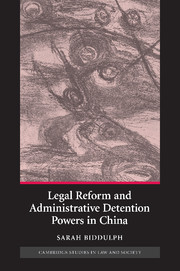Book contents
- Frontmatter
- Contents
- Preface
- Abbreviations
- Part 1 Introduction and conceptual framework
- Part 2 Social order and administrative detention
- Part 3 Legal reform and its impact on administrative detention
- 7 Building a legal environment for police detention
- 8 Supervision of police conduct: legalisation and contest
- 9 Legal reform catches up with administrative detention
- Part 4 Analysis and conclusion
- Appendix 1 Index of Legislation, administrative regulations, rules, normative documents, Party documents, speeches and cases
- Bibliography
- Index
8 - Supervision of police conduct: legalisation and contest
Published online by Cambridge University Press: 27 July 2009
- Frontmatter
- Contents
- Preface
- Abbreviations
- Part 1 Introduction and conceptual framework
- Part 2 Social order and administrative detention
- Part 3 Legal reform and its impact on administrative detention
- 7 Building a legal environment for police detention
- 8 Supervision of police conduct: legalisation and contest
- 9 Legal reform catches up with administrative detention
- Part 4 Analysis and conclusion
- Appendix 1 Index of Legislation, administrative regulations, rules, normative documents, Party documents, speeches and cases
- Bibliography
- Index
Summary
INTRODUCTION
Ensuring that central policies are implemented at the local level in China has been understood as key to the maintenance of political power. Party elites have sought to ensure that the local political-legal organs, the police, procuratorates and courts comply with Party policy and directives, especially when conducting hard strikes. For leaders such as Peng Zhen, Party leadership over the police and law enforcement was essential to ensure that law and order policy was consistently enforced, as well as to prevent abuse of power. Decentralisation of power as a consequence of economic reform has made these objectives difficult to achieve.
In May 1988, the Legislative Affairs Bureau of the State Council discussed two major problems of poor law enforcement amongst administrative agencies. The first was inadequate legal empowerment of administrative agencies. The second was serious problems of dereliction of duty, abuse of power and unlawful actions by officials exercising their enforcement powers. To address these problems, the meeting resolved to provide a more complete legal basis for administrative action; to improve procedural law; and to strengthen mechanisms for controlling administrative conduct. To strengthen supervision, the meeting proposed instituting systems for supervision, improving self-regulation and raising the standard of officials.
The problem of abuse of power is most acute amongst the public security organs. In a 1992 survey sampling eighteen provinces, 35.1 per cent of respondents identified the public security organs as leaving the worst impression of all government departments.
- Type
- Chapter
- Information
- Legal Reform and Administrative Detention Powers in China , pp. 275 - 330Publisher: Cambridge University PressPrint publication year: 2007



